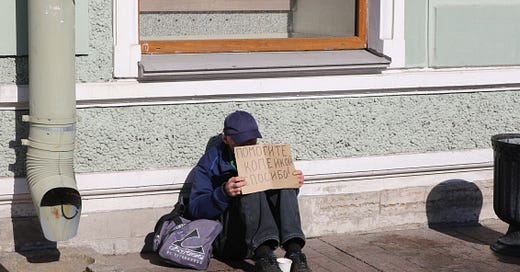Yuri Ugolnikov
Recently, a wave of indignation swept through the conservative and ultra-patriotic media. The Tsargrad TV channel in particular was quite indignant over the unwillingness of fellow citizens to shed blood in the steppes of Ukraine, which has now become to obvious to ignore. Since ultra-patriots still claim to be speaking on behalf of the people, accusing these very same people of a lack of patriotism looks somewhat awkward; so to explain the citizens' lack of enthusiasm, it was necessary to find a guilty party, who turned out to be insufficiently zealous propagandists and lazy officials who supposedly, from the first days of a very special military operation, have lulled the population into a stupor: "Lie down, great nation! Lie down and don't get up."
This accusation, of course, is paradoxical: it’s trying to address a real state of affairs, but it’s hard to imagine that this is convincing their fellow citizens of anything. One need only watch the antics of Margarita Simonyan, or even Vladimir Solovyov, both still diligently screaming from the TV screen. They're doing their best.
What is even more comical in this situation is that the accusations of the ultra-patriots turn out to be absolutely symmetrical with the accusations of the ultra-liberals. The latter, however, do not hesitate to directly criticize the Russians, who, if they were a “normal” people, would long ago have overthrown the hated authoritarians and established democracy “as in the best houses of London and Paris.”
Indeed, neither overthrowing anyone at home nor fighting abroad, our compatriots for the most part are not eager to engage at all, preferring methods of passive resistance, or at least passive support: evasion and emigration in the first case and merely hanging ritual yellow-black ribbons and Z signs in the second.
This attempt to solve their problems in a strictly individual manner has at least the tacit support of the current government, which is trying not to interfere too much: after all, a mass exodus is in every way safer for it than mass protests.
I confess that the degree of passivity in our fellow citizens was unexpected even by me, but to simply declare that “the people are wrong” is at best naive. The passivity of Russians is largely due to the extreme distrust of any figure involved in public affairs. And this mistrust did not grow out of nowhere.
The trauma caused by the collapse of the USSR has been discussed at great length elsewhere, but let us recall another, perhaps more significant event: the coming to power of Boris Yeltsin and his entourage and their subsequent “reforms.” Thse caused a huge shock among the Russians, perhaps even greater than the shock from the actual collapse of the USSR, although since these events are interconnected, propagandists and ideologists of various stripes easily substitute one for the other. It was Yeltsin's reforms that undermined the confidence of fellow citizens in mass politics almost completely. Having achieved power at first precisely thanks to left-wing rhetoric (Yeltsin, let me remind you, began as a critic of the nomenklatura and party leaders of the USSR), this politician immediately corrected himself, and forgot his previous indignation over social inequality; indeed, forgot so well that the difference in the level of income between the poorest and richest sections of our long-suffering population - the real legacy of his “reforms” - has become, and still remains, obscene. The collapse of the USSR affected many, bringing poverty to almost everyone.
The arrival of democracy and public politics in Russia turned out to be a huge swindle. And this has for decades scared citizens away from participating in politics or from supporting any social and political movements. Even Putin's power in the country was initially treated with some sympathy, largely because he was not really a political figure at all. An extremely skeptical attitude towards politics as such gave us one of the most striking slogans of the protests of 2011-2013 (primarily the protests of 2011, after the elections State Duma elections): “We didn’t vote for these bastards, we voted for the other bastards.”
Distrust, formed back in the early 90s (and has noticeably strengthened since then), makes Russians try to solve problems on their own to the last, and to shy away from participating in any social movements. For how long our fellow citizens will be able to adhere to this strategy is a question to which I will not give an answer. As the authorities increase pressure on this society, trying to mobilize it to solve its geopolitical problems, they may just inadvertently create this necessary solidarity . However, I will make no further guesses here about the future.




'Passivity' and 'divide and conquer' are the main obstacles to a progressive mass movement in the USA, too. What's different, today, is that the climate clock is ticking, further complicating things. In the US, only about half of the population even think climate change is real. What is the situation in Russia? How many people understand that a finite planet with finite resources cannot tolerate infinite growth, no matter how it is distributed or how 'green' the commodities are.
The homelessness and hunger seen in the streets of major cities in America are unbelievably bad. It is hard to imagine that the gap between the rich and poor in Russia is comparable to America. Please help us understand Russia better by showing us statistics of income in Russia in the past 30 years, because it is hard to take seriously essays that aren't grounded in these facts. Lastly, in America, President Biden provided a temporary Covid supplemental benefit due to expire after he was re-elected, not actually related to Covid levels! This temporary increase in income is a blip right before the current free fall of rapidly increasing homelessness and hunger.